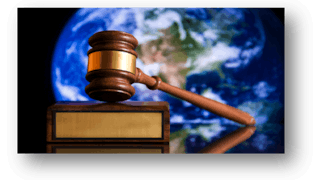International Law in Action explains the functions of each international court and tribunal present in The Hague, and it looks at how these institutions address contemporary problems. On the basis of selected cases, and through interviews with judges and lawyers, you will explore the role of these courts and tribunals and their potential to contribute to global justice.

Enjoy unlimited growth with a year of Coursera Plus for $199 (regularly $399). Save now.

International Law in Action: A Guide to the International Courts and Tribunals in The Hague



Instructors: Larissa van den Herik
61,723 already enrolled
(1,219 reviews)
Skills you'll gain
Details to know

Add to your LinkedIn profile
See how employees at top companies are mastering in-demand skills

There are 5 modules in this course
Welcome to this first week in which we will enter the world of the international judiciary with you. We will discuss the evolution of international dispute settlement in our international legal order. The leading question is: why did people start thinking about creating international courts? We will also introduce the community of international courts present in The Hague today.
What's included
8 videos3 readings1 assignment1 discussion prompt1 plugin
This week we are going to explore the principle judicial organ of the United Nations—the International Court of Justice. This Court has dual functions as an institution that settles disputes between States, and as an advice giver within the UN system. We will explore the limitations that the Court faces in its fulfilment of these functions as well as its potential as an institution, particularly in the context of disputes involving the protection of the environment. From this week onwards, you will also be able to start working on the peer assignment. All relevant information with regard to the peer assignment can be find below. We look forward to reading how you view the future of the international courts and tribunals in The Hague!
What's included
5 videos2 readings1 assignment1 peer review
This week, we will explore the world of international arbitration. More specifically, we will focus on the Permanent court of arbitration, inter-state arbitration and investor-state arbitration. Through our videos, you will discover the history and characteristics of arbitration and you will understand how its functioning is impacted by the dynamics at play within the international and domestic societies. You will also come to realize the importance of public interests in the disputes settled through arbitration and you will learn how they are taken into account in international arbitration.
What's included
5 videos2 readings1 assignment
This week examines a relatively new type of international courts, namely international criminal courts, with a focus on the ICC. We will discuss ongoing cases and debates, including sensitive issues such as the prosecution of sitting Heads of States. We will also inquire whether the international community is in need of a new dedicated international terrorism tribunal.
What's included
5 videos3 readings1 assignment
This week, we will directly focus on the three course themes that have structured our discussions in the previous modules: law and politics, state consent and global values. For each of these themes, the videos of this module will give you the opportunity to synthetize the knowledge that you have acquired over the course and to compare the various courts and tribunals that have been analyzed through the lenses of the course themes. The videos in this module will also offer you some concluding observations and insights which will stimulate you to continue to reflect on these three themes and the international courts in The Hague more generally. This week, you will also take the final exam of this course; good luck on this!
What's included
3 videos1 assignment
Instructors


Offered by
Explore more from Law
 Status: Preview
Status: Preview Status: Preview
Status: PreviewUniversiteit Leiden
 Status: Preview
Status: PreviewCase Western Reserve University
 Status: Preview
Status: PreviewUniversiteit Leiden
Why people choose Coursera for their career




Learner reviews
1,219 reviews
- 5 stars
82.39%
- 4 stars
14.74%
- 3 stars
2.04%
- 2 stars
0.40%
- 1 star
0.40%
Showing 3 of 1219
Reviewed on Jan 3, 2017
The course was extremely informative with a holistic perspective on the functioning of various international courts as well as special courts addressing international law issues.
Reviewed on Aug 13, 2016
Fantastic Course, taught wonderfully well by the three extraordinary instructors. A definite to do for an introductory understanding of the international legal system.
Reviewed on Feb 15, 2016
A very informative and valuable learning experience. Highly recommended for the global citizen striving to navigate the often complex halls of international power and justice.
Frequently asked questions
To access the course materials, assignments and to earn a Certificate, you will need to purchase the Certificate experience when you enroll in a course. You can try a Free Trial instead, or apply for Financial Aid. The course may offer 'Full Course, No Certificate' instead. This option lets you see all course materials, submit required assessments, and get a final grade. This also means that you will not be able to purchase a Certificate experience.
When you purchase a Certificate you get access to all course materials, including graded assignments. Upon completing the course, your electronic Certificate will be added to your Accomplishments page - from there, you can print your Certificate or add it to your LinkedIn profile.
Yes. In select learning programs, you can apply for financial aid or a scholarship if you can’t afford the enrollment fee. If fin aid or scholarship is available for your learning program selection, you’ll find a link to apply on the description page.
More questions
Financial aid available,
¹ Some assignments in this course are AI-graded. For these assignments, your data will be used in accordance with Coursera's Privacy Notice.





